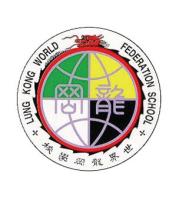| Language Policy |
To educate students to be biliterate and trilingual using a whole-school approach. From morning assembly to classroom teaching we offer students with ample opportunities to use English and Putonghua as medium of learning. |
| Learning and Teaching Strategies |
We aim to nurture our students to be self-directed learners through a holistic and balanced curriculum.<br>1. Teachers across subjects designed a variety of pre-lesson learning tasks such as flipped classroom videos and worksheets to instill a good learning attitude in students.<br>2. All subjects devise teaching materials to enhance students’ self-directed learning with the assistance of IT learning and BYOD policy. <br>3. Students are guided to apply notetaking skills which facilitate their learning through promoting oragnisation of notes and extended learning skills. <br>4. School based measures like “collaborate lesson planning measures” and “peer lesson observation”, students’ learning efficacy could be greatly enhanced.<br>5. A variety of whole school academic activities and thematic weeks has effectively boost the learning atmosphere. With the interesting and engaging learning activities organised, students can enjoy learning authentically. <br>6. Cross-subject project-based learning is in place to develop students’ generic skills and promote diversified learning. <br>7. Students’ learning diversity, especially in English Language learning, is catered for. Extended English learning activities and split-group small class teaching are arranged in S.3 and senior forms. Students can learn English with fun through an array of co-curricular activities like English Week, Speech Festival and English Drama. <br>8. eReading is emphasised to provide students with a diversified learning experience. Students can read extensively through the school’s free eReading platform regardless of location and time. <br>9. Students are encouraged and nominated to participate in a variety of activities and competitions to display their learning outcomes in a bid to boost their confidence in learning. |
| School-based curriculum |
1. Electives: 2X and 3X. Besides 4 core subjects, senior form students can select 2-3 elective subjects among the 15 choices.<br> 2. Curriculum highlights: Ideas of science, design and innovativeness are incorporated into the school curriculum through STEAM lessons. |
| Approach to Catering for Learner Diversity |
For student development, two class teachers are deployed for each S.1-S.6 class. Form meetings are convened to provide care and support to students. We also organise a wide array of activities for students in need through funding projects. To cater for learner diversity, S.4-S.6 students are streamed into smaller groups for English, Chinese, Mathematics and Liberal Studies. Various learning support measures such as Social Skills Classes, Reading and Writing Classes and Peer Support Groups have been adopted to support students with diverse needs. |
| Approach to Integrated Education |
Inclusive Education is carried out in a whole school approach. The Student Support Committee comprises the Vice Principal, a guidance teacher, SEN coordinator, a teaching assistant and social workers. The school also works closely with EDB and the educational psychologist to conduct periodic assessments. Parents are invited to meetings to work out an individual education plan for their children, evaluate the effectiveness of such plans, and learn skills that can help and guide their children holistically.<br><br>The school uses the Learning Support Grant and Grant for Supporting Non-Chinese Speaking Students with Special Educational Needs to hire services such as speech therapy, social skills training, after-school support, and hiring qualified personnel specializing in support for students with SEN. |
| Education Support for Non-Chinese Speaking (NCS) Students |
|
| Home-School Co-operation |
The Parent-Teacher Association (PTA) actively organizes various school activities to promote cooperation between parents and the school. These activities include regular parent seminars and parent-child events. Since July 2006, the establishment of parent manager participates in school management and decision-making. The school aims to establish a transparent school-based management governance framework, involving the participation of different stakeholders. Additionally, class teachers regularly contact parents to enhance communication and collaboration. |
| School Ethos |
Our school stresses self-discipline and a simple way of life. School social workers work closely with the Guidance Committee to help students adapt to school life and enhance personal growth and confidence. Through school assemblies, class teacher periods, theme talks and various award schemes, values formation and other developmental programmes, students are supported with love and care. |
| School Development Plan |
We are determined to strengthen the efficacy of learning teaching in the coming 3 years, igniting students' for self-directed learning across different subjects. We are also dedicated to fostering students' positive core values. |
| Teacher Professional Training and Development |
Professional Development Days for teachers are held three times every year. The focus is to enhance learning and teaching efficacy. Teachers are encouraged to attend training courses organised by EDB and other institutions. Learning circles are established by professional sharing and collaborative lesson planning. School-based training workshops like using apps and IT platforms are organised regularly and when needed. |
| Life-wide Learning |
Students are fully exposed to other learning activities outside classrooms. The school offers different opportunities to students, with an inclusion of community services, activities, learning weeks, workshops, field trips and study tours to widen students' scope of experience. Many activities are organised by the Students' Association, Houses, 47 ECA clubs and service teams. Students also take part in Life-wide Learning Day, Business-School Partnership Programme (BSPP), Mainland and overseas exchange tours, community & museum visit or flag-selling activities. These activities play a vital part in students' lives and learning. Among them, girls' volleyball, girl guides, dragon dance, rope skipping, school band, STEAM Club as well as Drone and Campus TV Club are the ones of many great things. |
